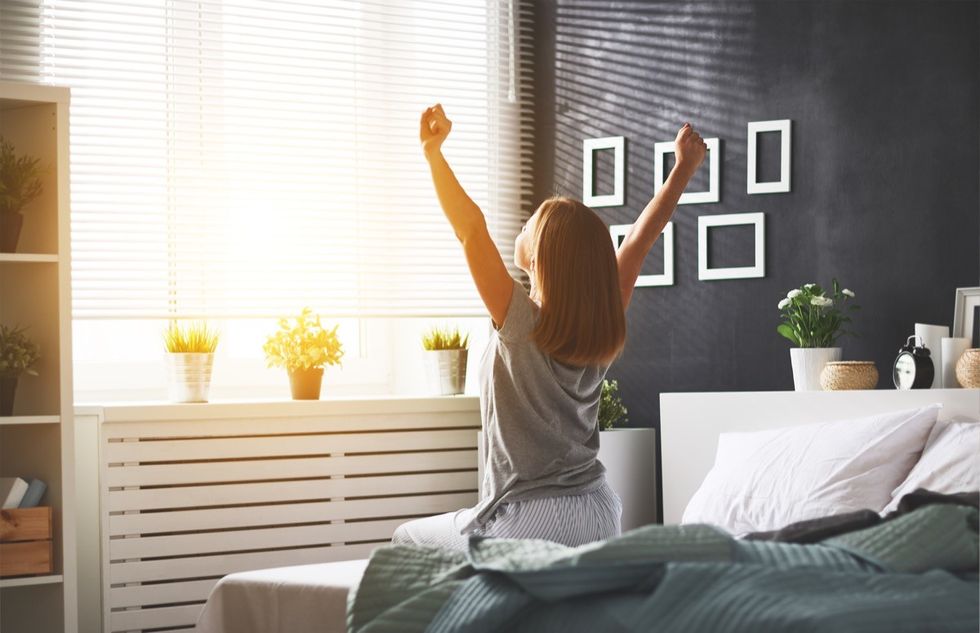According to the National Coffee Association (NCA), coffee is overwhelmingly the caffeinated beverage of choice for people in the United States, with 63% of Americans drinking coffee every day. 81% of people have coffee with breakfast, 15% with lunch, and 19% enjoy their brew in the afternoon. “There are many benefits to drinking coffee,” wellness dietitian Knubian Gatlin tells Houston Methodist. “The caffeine content can help increase energy levels, alertness, improve cognitive function and enhance performance during physical activity. Additionally, one of the byproducts of caffeine, paraxanthine, plays a role in fat metabolism.” But is morning really the best time to drink coffee for maximum energy-boosting efficacy? Here’s what the experts have to say.
RELATED: 22 Incredible Health Benefits of Coffee.
Morning Cortisol
Shutterstock
Your body naturally releases cortisol in the morning—and caffeine encourages that cortisol to spike, too. “Your cortisol levels typically peak between 7 a.m. and 8 a.m. and gradually drop throughout the day, reaching their lowest point in the middle of the night while you sleep,” says the Cleveland Clinic. “In this way, cortisol helps your body maintain its sleep-wake cycle, known as the circadian rhythm.” The extra cortisol first thing can make some people feel jittery.
Coffee and Cortisol

Because coffee spikes cortisol, your body might become reliant on it to wake up. “Caffeine also increases cortisol levels,” Gatlin says. “This can help really wake us up, but it makes sense that, over time, your body might eventually adapt to produce less cortisol on its own if you drink a cup of coffee first thing every morning.”
The Morning Coffee Sweet Spot
Shutterstock
Many experts say the sweet spot for coffee is approximately 90 minutes after waking. “Coffee contains caffeine, which is a natural stimulant,” nutritionist Mugdha Pradhan, founder of iThrive, tellsVogue. “This means it can boost your metabolism by increasing the body’s heart rate and energy expenditure. That’s why drinking coffee in the morning, about 90 minutes after waking up, works well, because it syncs up with the body’s natural cortisol rhythm.”
Coffee on Empty Stomach

By waiting at least an hour, your body won’t become reliant on the coffee for energy, and you will avoid some of the more unpleasant side effects of drinking coffee on an empty stomach. “Although it helps wake us up, I often recommend waiting to have your first cup of coffee until about an hour or two after waking up,” Gatlin says. “This allows your body to use its own resources for energy first. Caffeine tends to increase stomach acid and bile production, which can exacerbate symptoms of acid reflux.”
Coffee Health Benefits
iStock
Assuming you aren’t loading your morning brew with sugar, coffee is actually very good for your health. “Both regular and decaf coffee seem to have a protective effect on your liver,” says Johns Hopkins Health. “Research shows that coffee drinkers are more likely to have liver enzyme levels within a healthy range than people who don’t drink coffee.” Coffee also lowers the risk of Alzheimer’s disease, stroke, and colon cancer, Parkinson’s, and heart disease.
Coffee At Night

One thing all the researchers seem to agree on is coffee in the evening should probably be avoided. “Research on the exact timing of caffeine’s impact on sleep is limited, but there is one small study showing that having caffeine as early as six hours before bedtime can affect sleep, even if you don’t notice the disruption,” Dr. Rashad Ramkissoon, a primary-care physician at Houston Methodist. “When it comes to getting quality sleep, it’s better to be safe than sorry. So that’s a good timeline to work from no matter your usual bedtime.”



